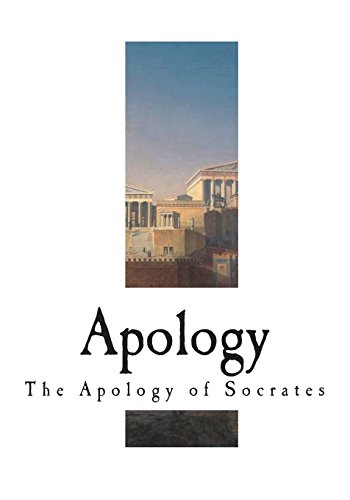-
The Apology of Socrates
Plato
eBook (Passerino Editore, June 27, 2017)The Apology of Socrates by Plato, is the Socratic dialogue that presents the speech of legal self-defence, which Socrates presented at his trial for impiety and corruption, in 399 BC.Plato (428/427 or 424/423 – 348/347 BC) was a philosopher in Classical Greece and the founder of the Academy in Athens, the first institution of higher learning in the Western world. Translated by Benjamin Jowett (1817 – 1893)
-
Apology of Socrates
Plato
eBook (Listen Books, Nov. 18, 2014)The Apology is Plato's version of the speech given by Socrates as he defended himself in 399 against the charges of "corrupting the young, and by not believing in the gods in whom the city believes, but in other daimonia that are novel"
-
Apology
Plato, Benjamin Jowett
eBook (Wildside Press, June 21, 2018)APOLOGY (The Apology of Socrates), by Plato, is the Socratic dialogue that offers the speech of legal self-defence, which Socrates presented at his trial for impiety and corruption in 399 BC.
-
The Apology of Socrates
Plato
eBook (Strelbytskyy Multimedia Publishing, Sept. 7, 2018)The Apology of Socrates was written by Plato. In fact, it's a defensive speech of Socrates that he said in a court noted down by Plato.The main subject of the speech is a problem of the evil. Socrates insists that neither death nor death sentence is evil. We shouldn't be afraid of the death because we don't know anything about it. Socrates proved that the death shouldn't be taken as the evil with the following dilemma: the death is either a peace or a transit from this life to the next. Both can't be called evil. Consequently, the death shouldn't be treated as evil.
-
Apology
Plato, Benjamin Jowett
Paperback (A Plato Book, June 20, 2018)APOLOGY (The Apology of Socrates), by Plato, is the Socratic dialogue that offers the speech of legal self-defence, which Socrates presented at his trial for impiety and corruption in 399 BC.
-
The Apology of Socrates: As Written by His Friend and Pupil, Plato
Plato Plato
Paperback (Forgotten Books, April 5, 2018)Excerpt from The Apology of Socrates: As Written by His Friend and Pupil, PlatoCrime. His defence, his apologia or the apol ogy as it is generally called, is the subject of the little book which here follows. This book was.About the PublisherForgotten Books publishes hundreds of thousands of rare and classic books. Find more at www.forgottenbooks.comThis book is a reproduction of an important historical work. Forgotten Books uses state-of-the-art technology to digitally reconstruct the work, preserving the original format whilst repairing imperfections present in the aged copy. In rare cases, an imperfection in the original, such as a blemish or missing page, may be replicated in our edition. We do, however, repair the vast majority of imperfections successfully; any imperfections that remain are intentionally left to preserve the state of such historical works.
-
The Apology of Socrates
Plato
Hardcover (Cambridge University Press, Aug. 16, 1959)None
-
The Apology of Socrates
Plato (as translated by Benjamin Jowett)
MP3 CD (IDB Productions, Aug. 16, 2010)The Apology of Socrates by Plato is Plato’s detailed account of the defense Socrates gave his accusers and his judges at the trial where he stood accused of corrupting young minds. Plato writes the account as a drama from Socrates’ point of view. No one knows if this is an accurate account of the trial of Socrates, or if it is Plato’s artistic interpretation. The apology, or defense, is divided into three parts. During the first part, Socrates addresses his accusers and defends himself against the charges brought against him. He has been accused of corrupting the minds of the young and worshipping his own gods rather than the ones acknowledged by the state of Athens. Socrates blames these unfounded accusations on jealousy, gossip, and misunderstanding. He fervently believes that he just imparts knowledge to his students, and points out that none of his students or their parents ever declared corruption was taking place. The second part is Socrates response to his subsequent conviction. It was custom that the defendant could suggest their own penalty. Socrates irritates the court by suggesting his penalty be to receive free meals in one of the buildings that housed the Council. Socrates is sentenced to death by poison. The final part of the apology consists of Socrates response to the verdict. He addresses both those who voted for his death, and those who voted for his acquittal. In a later work, Plato describes Socrates’ dramatic execution. The Apology of Socrates by Plato incorporates a great deal Plato’s philosophies derived from his teacher, Socrates. Today, it is viewed as a great philosophic work that expounds upon the Socratic method, as well as a possible historical account of the life and death of Socrates. Title: The Apology of Socrates Author: Plato (translated by Benjamin Jowett) ISBN: 9781775420514 Version: Unabridged Language: English Reader: Solo Male Format: MP3 Audio CD Tracks / Chapters: 4 Chapters Total running time: 01:11:42
-
Apology: The Apology of Socrates
Plato, Benjamin Jowett
Paperback (CreateSpace Independent Publishing Platform, June 24, 2018)Apology by Plato and translated by Benjamin Jowett: The Apology of Socrates. The Apology of Socrates by Plato, is the Socratic dialogue that presents the speech of legal self-defence, which Socrates presented at his trial for impiety and corruption, in 399 BC. There is not much in the other Dialogues which can be compared with the Apology. The same recollection of his master may have been present to the mind of Plato when depicting the sufferings of the Just in the Republic. The Crito may also be regarded as a sort of appendage to the Apology, in which Socrates, who has defied the judges, is nevertheless represented as scrupulously obedient to the laws. In what relation the Apology of Plato stands to the real defence of Socrates, there are no means of determining. It certainly agrees in tone and character with the description of Xenophon, who says in the Memorabilia that Socrates might have been acquitted 'if in any moderate degree he would have conciliated the favour of the dicasts;' and who informs us in another passage, on the testimony of Hermogenes, the friend of Socrates, that he had no wish to live; and that the divine sign refused to allow him to prepare a defence, and also that Socrates himself declared this to be unnecessary, on the ground that all his life long he had been preparing against that hour.
-
The Apology of Socrates.
Adela Marion Adam
Hardcover (Syndicates of The Cambridge University Press, Aug. 16, 1964)This addition, which you intended for those who have only lately begun the study of Greek, is based on the edition by my husband in the Pitt Press series. Where no simplification or abridgement seem necessary, I have not hesitated to use the original wording, but the notes have been for the most part, and the introduction entirely, rewritten. The vocabulary have been added. I have made considerable use of Mr. H. Williamson's edition, published into my husband's lifetime. I am very glad that Professor Burnet’s most interesting work, Greek Philosophy, Thales to Plato, appeared just in time to enable me to consult it when writing the introduction.
-
The Apology of Socrates: As Written by His Friend and Pupil, Plato
Plato Plato
Hardcover (Forgotten Books, April 5, 2018)Excerpt from The Apology of Socrates: As Written by His Friend and Pupil, PlatoCrime. His defence, his apologia or the apol ogy as it is generally called, is the subject of the little book which here follows. This book was.About the PublisherForgotten Books publishes hundreds of thousands of rare and classic books. Find more at www.forgottenbooks.comThis book is a reproduction of an important historical work. Forgotten Books uses state-of-the-art technology to digitally reconstruct the work, preserving the original format whilst repairing imperfections present in the aged copy. In rare cases, an imperfection in the original, such as a blemish or missing page, may be replicated in our edition. We do, however, repair the vast majority of imperfections successfully; any imperfections that remain are intentionally left to preserve the state of such historical works.
-
The Apology of Socrates.
Plato.
Hardcover (The Scholartis Press, Aug. 16, 1929)None